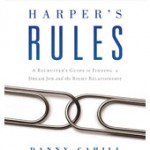
According to Danny, too many agency owners still insist the telephone is the only way to do business. According to Danny, not enough recruiters walk away from impossible searches. According to Danny, reference checks are a great sales tool, not a chore; when you pawn them off on the client, you miss an opportunity.
Who is this guy Danny with all these unconventional ideas? He’s Danny Cahill, multi-millionaire owner of Hobson’s Associates, the placement agency where he first worked a desk before buying the whole place. When he was 27.
He’s a speaker; a conference keynoter once voted the most popular speaker on the recruiting circuit and a National Association of Personnel Services Hall of Famer.
He’s a trainer; owner of AccordingToDanny.com, and was educational chair of that exclusive organization for big billers, The Pinnacle Society. He’s the winner of the first David Knutson Memorial Award for Lifetime Achievement in Recruiting
He’s also a playwright, a published author, body builder, and the last man you want to take marital advice from, even if his latest book, Harper Rules, is all about how to get a job and find love. “Ironic,” admitted Cahill, a twice divorced, self-described introvert, and timid suitor.
 And yet, he says, people assume he’s Harper, the hip, erudite headhunter who coaches Casey, the talented and successful, but weary, lonely, even discouraged divorced executive. Those who know him best know he’s more Casey.
And yet, he says, people assume he’s Harper, the hip, erudite headhunter who coaches Casey, the talented and successful, but weary, lonely, even discouraged divorced executive. Those who know him best know he’s more Casey.
“I tried to take my experience… and make it less painful for me to write about by hiding behind Casey,” he explains.
The Danny You Don’t Know
To those who have seen him delivering a keynote or leading a session, it’s hard to imagine Cahill as a private, even shy person. He draws inspiration for his appearances from his life, sharing intimacies on conference stages around the world. His very first conference speech, he says, came the morning after his first wife informed him she was getting a divorce. It formed the basis of his talk that day, and was how he came to see career and courtship as two sides of the same coin.
For the longest time, though, Cahill would deliver his speech, accept a few congratulations, then beeline to his hotel room where he would hide out for the duration. “People would think of me as aloof,” he says. But, “I was afraid they would figure out I was faking it. I’ve been divorced and lonely. I’ve been afraid of failing. I grew up poor and every day I was ashamed of that.”
He remembers as a teenager questioning his father about the family’s poverty and why he didn’t aspire to more than the factory work he did. “He couldn’t understand why I was ashamed,” says Cahill, who today recognizes Tom Cahill as a loving, hardworking father.
For some, the gritty reality of growing up poor leads to more of the same as an adult. For others, it fuels a drive to get up and get out. Danny was one of the latter. He went to college and majored in English. Even in the 1970s, an English degree was no ticket to success, but he had a knack for writing and, discovering theater while still at the University of Connecticut, began writing plays. Not long out of school, Cahill’s play, Cornish Game, was being produced off-Broadway. It won him recognition and the Maxwell Anderson and CAB Theater awards.
Recruiter By Day, Playwright At Night
By then, he was earning enough as a headhunter to own a Mercedes, which he parked blocks from the theater, hiding his new found wealth as he once did his poverty.
He’d work all day in Connecticut recruiting, then drive to Manhattan for rehearsals and script readings, go home, sleep for a few hours, then do it all again the next day. Somewhere and somehow he managed to fit in classes at Wesleyan College where he earned a Master’s in English.
How he could do it, even Cahill isn’t sure. Youthful energy helped. So did the excitement of rubbing shoulders with celebrities like Bill Murray. “I thought this was cool. This life.”
His boss at Hobson Associates had a different explanation. “He said I had this rage to get everything done at the same time,” said Cahill, who only a few years after starting his career, bought the agency, building it into one of the leading firms in the nation for software sales, bio tech sales and industrial sales talent.
He didn’t set out to be a recruiter; almost no one does today either. His fiancée’s father insisted he have a real job; one that would give him a regular paycheck. They found a sales job advertised in the newspaper. Cahill applied, was interviewed, and, abruptly excused at the end, angrily told the owner, “Don’t you go dismissing me. You stand up and shake my hand.” He’d never advise a candidate to do that, but it landed him the job, a career, and a lifelong love affair with the business.
“There’s something wonderful now about what I do. I get to call the Tom Cahills of the world and help them get that better job I wanted my father to have,” he says.
Success From Breaking Rules
 Of his success Cahill says it comes from breaking the rules – the right rules when it makes sense. “I walk away from most searches,” he says. “One of the first things I will teach (his own rookies and his AccordingtoDanny students)… Their most precious asset is time. Don’t waste it on bad searches.”
Of his success Cahill says it comes from breaking the rules – the right rules when it makes sense. “I walk away from most searches,” he says. “One of the first things I will teach (his own rookies and his AccordingtoDanny students)… Their most precious asset is time. Don’t waste it on bad searches.”
A bad search is a search for a company with “no story. I don’t care if they’re paying a big salary, have great benefits, all that. Are they growing? What’s their success story? What’s it like to work there? Why would candidates say ‘That’s a great company to work for’?”
He also doesn’t necessarily hire accomplished sales people as recruiters, and he certainly stays away from those who declare themselves to be “people pleasers.” Neither “frustrated social workers” nor the recruiter with “the big personality, the one who’s everyone’s friend,” make good recruiters, says Cahill.
“I’m looking for someone who reads people well. The business is understanding people,” he explains. “Some people have that. Some people don’t.”
No Phone Jockeys
Another heresy he practices is to ignore the conventional wisdom that every recruiter must make 25, 30 or 50 calls a day. Most owners today look for a phone jockey, says Cahill. Someone who can keep dialing and dialing, ignore the hang-ups and unreturned messages and just call again. “I grew up in that high testosterone environment,” he says. “But it has absolutely nothing to do with the way we do business today.”
“You reach out to people the way they want you to… Walk into my office and you’d find six people on the phone, four writing emails, and more doing research online. People (candidates) spend more time online than anywhere else. But everyone is looking for the guy who can spend hours on the phone.
“That’s not my guy anymore. And it shouldn’t be anybody’s.”
“We’re so good at selling change and we’re so terrible at making the change ourelves,” Cahill said not long ago. “I just believe the story isn’t written in anybody’s life until the very last day.”